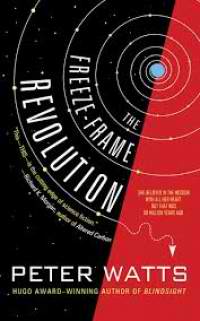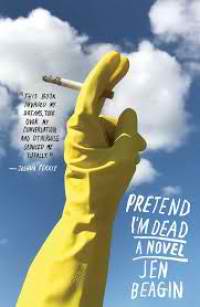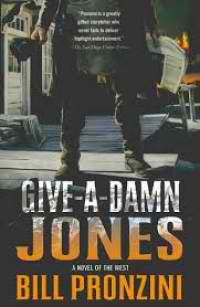The Freeze-Frame Revolution by Peter Watts
 Friday, June 1, 2018 at 10:20AM
Friday, June 1, 2018 at 10:20AM 
Published by Tachyon Publications on June 12, 2018
Everyone who has seen 2001: A Space Odyssey knows that it is unwise to put an Artificial Intelligence in charge of a spaceship. The time will eventually come when humans need to plot against the computer. The Freeze Frame Revolution asks how that might be done when humans are mostly in stasis, with only a few at a time awakened every few centuries to help the computer build gates across the galaxy, connecting wormholes so that future travelers will journey on interstellar freeways.
Thirty thousand explorers on a sizeable ship have been building those gates for 65 million years. They don’t know if Earth still exists. If it does, it isn’t the Earth they knew. Every now and then, a monster pops out of a gate they’ve built, perhaps trying to eat them, but they’re moving too fast to be devoured. So far, anyway.
Lian Wei is fed up with the monsters, but more than that, she’s fed up with her life. She knows that the explorers were engineered for longevity, to withstand thousands of years of sleep at a time, to be happy simulating the lives of humans long dead. She wants freedom in the form of self-determination. She wants her life experiences to be real. She thinks messing up the AI’s confidence algorithms, making it more dependent on its human crew, might give her what she wants. The ship has other ideas.
Lian confides in Sunday Ahzmundin, believing she might be of like mind. She’s not, at least initially. Thousands of years later, Sunday learns that other members of the crew have similar notions of freedom. Eventually feeling motivated to explore the vast ship, Sunday discovers a hidden chamber that leads to a revelation about the ship’s interaction with humans. Suddenly the question becomes: How does one plot a revolution against an AI that sees and hears everything, when the opportunity to interact with other humans only comes along once every few centuries, and when it’s unlikely that the same conspiring humans will be awakened at the same time? And more importantly (to Sunday, at least), how do you fight against the real enemy, mission planners who have been dead for scores of millions of years?
The Freeze Frame Revolution is hard science fiction, which I generally like, but maybe a little too hard for me, given that I’m not a scientist. I struggled with the nuts-and-bolts of the story, and while that’s my weakness, not the author’s, I had more fun reading Watts’ Echopraxia, which I found to be more accessible. In any event, the central plot doesn’t require a perfect understanding of the ship’s interaction with the universe or of the physics that underlie the crew’s conspiracy against the AI.
The plot moves the “evil AI” story in a new direction by assuming that an AI on a long-term mission won’t necessarily be all that smart, because machines are more likely to stay on track if they’re a bit limited and unimaginative (hence the need for a human crew). But even an Artificial Intelligence might turn out to be surprisingly intelligent, and as sf and mainstream writers alike have long noted, intelligence (artificial or otherwise) can’t be trusted.
As Sunday narrates the novel, she sometimes speaks directly to an audience. Guessing the identity of the audience she’s addressing is one of the novel’s many challenges.
Good science fiction, like all good literature, tells us something about the human condition. The Freeze Frame Revolution offers insights into how different personalities might respond to long but condensed lifespans spent under the watchful eye of a controlling computer, while at the same time asking how humanity might change when a cohort of humans, perhaps the last humans alive, are on a seemingly endless journey together.
RECOMMENDED



